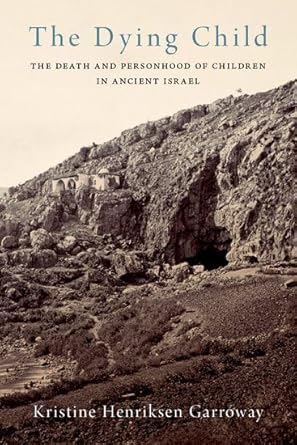
Kristine Henriksen Garroway offers a fascinating examination of how children were viewed in the biblical world. The Dying Child: The Death and Personhood of Children in Ancient Israel surveys the archaeological record of burials in ancient Israel from roughly the patriarchal period through the monarchical period (approximately 2,000-700 BC). In addition, Garroway brings the archeological evidence into conversation with the written record including the Old Testament. Both sources are then utilized to describe how children were viewed as persons in ancient Israel. I will offer a formal review of the book in a forthcoming volume of Concordia Journal that will include discussion of the growing field of “personhood” within scholarship. Before that review, a specific statement within the preface of the book occasions this article.
“For in understanding how a society thought about children we can learn how they thought about their future.” (Garroway, The Dying Child, ix)
That observation is simple, yet profound. It remains as true today as it did three millennia ago. Since the fall, the Lord has given hope to His people that the fall will be undone in the age to come. Death will be gone; life will be ours in full. Christ will wipe away tears from all eyes, including those that weep for a deceased child. Sorrow will be gone because all those who died in Christ will rise to life everlasting. That is worth the wait. It also calls us to respond accordingly.
First, all the ways in which we speak of death should reflect that hope. This is true whether the deceased was a child or advanced in years. A Christian funeral will not ignore the deceased’s life nor the present grief of those who survive even as Christ and the Church tend to them amid their sorrow. Most critically, the funeral will give attention to the deceased’s future. The Day is coming when the child will come forth from the grave bodily just as Christ rose bodily. A Christian funeral encourages family and friends to joyfully recall their days spent with the child because those days are but a foretaste of far greater days to be spent in eternal life. Similarly, tombstones ought to testify to the future resurrection of the faithful to life everlasting.
Yet it is not only in death that our view of children reveals our view of the future. How we think of children in this life reflects what we think of the future of this life. The world is beginning to recognize the impending demographic crises. With rates of reproduction in nearly every country having dropped below replacement rates, coming generations will face unique challenges. Books such as What to Expect When No One Is Expecting? have given attention to the coming challenges. My question is why has our age with unparalleled prosperity responded to that prosperity with an aversion to procreation? The reasons are multi-faceted. Among them is the delight in life being replaced by the delight in distractions from life. Our age is more interested in what cannot outlive us (hobbies and entertainment) than what will outlive us (the next generation). On one hand, it is understandable because my hobbies do not demand nearly as much from me as a child demands from me. But that is also the tragedy. The more something (or someone) demands of me, the more that thing (or person) enriches me.
Allow me to offer an example from my own life. Early in my childhood, I began to idolize academic success. Christ gave me the gift of a sharp mind, but I sinfully idolized my educational achievements. I feared academic failure more than I feared God; I loved my academic record more than I loved God; I trusted in my intellect more than I trusted God. In His grace, Christ used my son to free me of that idol. One of my children who is on the autism spectrum has struggled academically. That child does not lack intelligence, but his mind is unable to focus upon academic tasks. He has demanded a great deal of time and energy from me (and still does). Because of him, my idol of academic success is no longer as alluring as it once was. Even more, I am blessed to invest my time and energy in him because in him I see the future. His eternal future is bound up in Christ. God willing, my son will survive me with a grand future in this life. And my future in this life will be all the richer because this child (and his siblings) has been entrusted to me by Him who beckons the little children to come unto Him.



Leave a Reply
You must be logged in to post a comment.